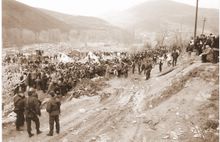
David Abel | Houston Chronicle | 4/14/1999
SKOPJE, Macedonia -- When Kosovo refugees began pouring over the Macedonian border a few weeks ago, authorities here in one of Europe's poorest countries issued a plea for help.
NATO answered the call. Soldiers erected massive tent cities, manned food stations, set up field hospitals and kept order in the camps.
Now, NATO is gradually removing itself from the humanitarian mission, handing control of the camps to Macedonian authorities and international relief agencies.
But the fading of NATO's presence has left many refugees worried.
"When we got here on the border, they treated us like animals," Lindita Latife, 21, said of Macedonian police at the refugee camp where she first stayed.
"I don't want to be at their mercy again."
Last week, Latife, an ethnic Albanian from Kosovo's capital of Pristina, was moved to a sprawling tent city built by NATO troops.
Scores of Kosovars interviewed in refugee camps said they were harassed by Macedonian authorities. All spoke of their desire for NATO troops to remain their guardians.
"The horror only got worse here," Lebibe Ibrahimi, 34, an elementary school teacher from Pristina, said of her arrival in Macedonia. "The police separated my family. I still don't know where they are. They beat us."
NATO officials say that much of the control over the camps will be in the hands of relief organizations, such as the U.N. High Commissioner for Refugees. Yet Macedonia will have sole responsibility for the refugees' security.
"The handover will be a process, not an event," promised Simon MacDowall, a NATO spokesman in Skopje.
Paula Ghedini, a spokeswoman for the U.N. refugee agency, said the United Nations has offered sensitivity-training classes to Macedonian police.
"In other operations, we recognized that police in most countries are not used to dealing with vulnerable populations," she said. "They're used to dealing with criminals."
Kosovar Albanians say they have another reason for being anxious about the Macedonian takeover of the camps. Ethnic Albanians, who make up about 23 percent of Macedonia's population of 2 million people, have long borne the brunt of discrimination, they say.
As Muslims speaking a different language than the Orthodox Christians who dominate the country, ethnic Albanians are treated like second-class citizens, the refugees say. Many Kosovar Albanians believe that most Macedonians sympathize with the Serbs.
"If you cut the Macedonian with an ax, seven Serbs come out," said one refugee at a camp in the village of Stankovic who asked not to be named.
On a recent night, thousands of men, women and children ambled about the garbage-strewn refugee camp in the village of Brazda, trying to keep warm. Some made small fires. Others walked along the camp's fence for exercise or to stave off boredom.
When refugees came too close to the barbed wire fence, beefy Macedonian police officers patrolling the perimeter with machine guns barked out orders to keep clear.
Arbana Rrustermi, 19, who left Kosovo with only a bag of clothes, said she hopes that the police stay outside the camp's fences.
"They were making jokes as women and children were dying," she said. "They were just cold. I saw them beat people. I saw them beat an old woman. They kicked her when she was on the ground.
"I will never forget that."

